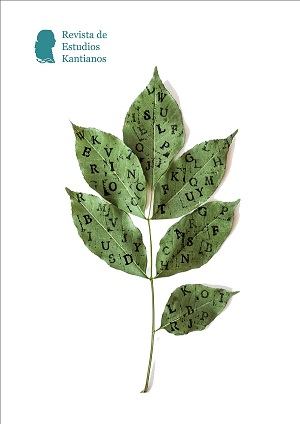Contemporary Science Between Theoretical and Practical Reason: A Transcendental-Pragmatic Approach to Quantum Theory
DOI:
https://doi.org/10.7203/ Abstract
Abstract
Resumen
El propósito de este trabajo es mostrar que la radical distinción kantiana entre razón teórica y razón práctica no puede ya mantenerse en el contexto contemporáneo de la teoría cuántica. Sostengo que las condiciones de la experiencia subjetivas, teóricas y a priori, tal como están representadas en la mecánica cuántica, se encuentran inexorablemente conectadas con las condiciones a priori de comunicación entre agentes en el mundo. Por lo tanto, la razón teórica no puede ser desvinculada de la razón práctica, tal como Kant afirma, sino que por el contrario tenemos ahora una capacidad racional unificada que es al mismo tiempo teórica y práctica, y, en este sentido, pragmática-transcendental.
Abstract
The aim of this paper is to show that in the contemporary context of quantum theory, the Kantian radical distinction between theoretical and practical reason can no longer be held. I argue that the theoretical and a priori subjective conditions of experience, as represented in quantum mechanics, are inexorably connected to the a priori conditions of communication between agents in the world. Therefore, theoretical reason cannot be detached from practical reason, as Kant holds, but on the contrary we now have one unified capacity for reason that is at the same time theoretical and practical, and, in that sense, transcendental-pragmatic.
 Downloads
Downloads
Downloads
Published
How to Cite
-
Abstract583
-
PDF (Español)302
Issue
Section
License
![]()
The authors who publish in this journal agree with the following terms:
- The authors retain their copyright and guarantee to the journal the right to be the first to publish the work and to license it under a Creative Commons Attribution License that allows others to share the work with an acknowledgement of its authorship and the initial publication in this journal.
- Authors may separately establish additional agreements for non-exclusive distribution of the version of the work published in the journal (for example, placing it in an institutional repository or publishing it in a book), with acknowledgement of its initial publication in this journal.
- Authors are allowed and encouraged to disseminate their work electronically (e.g., in institutional repositories or on their own website) before and during the submission process, as this can lead to productive exchanges as well as earlier and greater citation of published work (see The Effect of Open Access).








